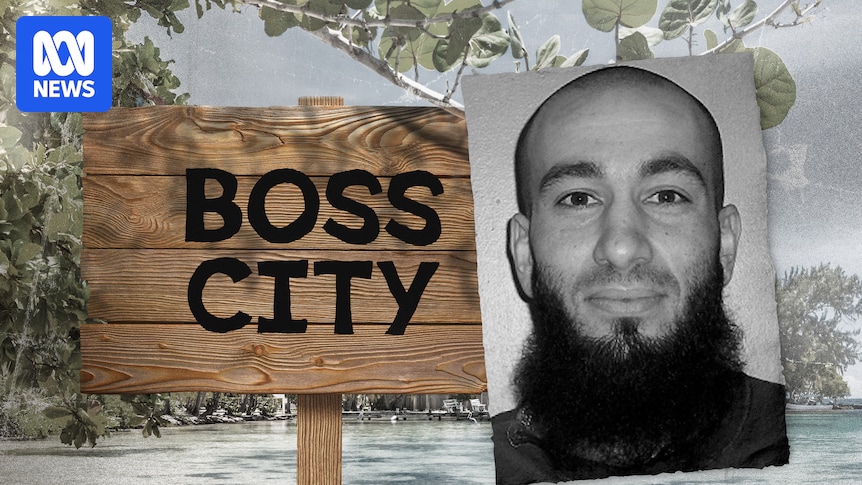
“We’re gunna probably make tens of millions of dollars.” This bold claim was made by notorious Sydney crime boss Bassam Hamzy during a secretly recorded call from his cell in Goulburn Supermax prison. Hamzy, the founder of the Brothers 4 Life gang, is currently serving time for a series of crimes, including the murder of a teenager in the late 1990s. Despite his incarceration, Hamzy has ambitious plans to develop a billion-dollar resort, whimsically dubbed “Boss City,” in the jungles of Belize.
The announcement of this grandiose project has raised eyebrows, especially in Belize, where local sources dismiss the plan as a non-starter. The ABC has tracked down individuals in Belize, including a former prime minister, who were allegedly involved in Hamzy’s scheme. However, the project seems to lack any real traction on the ground.
Grand Plans and Local Skepticism
Hamzy’s vision for “Boss City” first made headlines when news broke of his plans for the resort, located thousands of kilometers away from his prison cell. In a conversation with his lawyer, Martin Churchill, Hamzy expressed excitement over the project, stating, “Now that we have this approval, Martin, we’re gunna probably make tens of millions of dollars.”
Business records for the “Boss City Group” link back to a law firm associated with the Belize government, run by former Prime Minister Said Musa. However, there is no suggestion of wrongdoing on Mr. Musa’s part, and the law firm has not responded to inquiries from the ABC.
Official Denials and Investigations
Belize’s Tourism Minister, Anthony Mahler, was caught off guard when asked about the project. “Absolutely not,” he replied when questioned about his awareness of the resort plans. “If they’re going to have that level of investment, we would know. This is the first I’m hearing of it.”
Further investigation by the Belize Tourism Board revealed no registered development under the name “Boss City” or associated with Hamzy. Jacob Leslie, the registrar of hotels, confirmed, “No licence has been issued to that individual or company.”
“There is no development registered with the Belize Tourism Board under that name or by the person associated with that name.” — Jacob Leslie, Belize Tourism Board
Hamzy’s Expansive Business Ventures
Despite the skepticism surrounding his Belizean venture, Hamzy has managed to maintain a sprawling business empire from behind bars. Recorded conversations from Goulburn’s Supermax prison, presented in the Sydney District Court, reveal Hamzy’s involvement in various enterprises, from construction projects to nightclub investments in South America.
In one conversation, Hamzy detailed plans to invest in Peruvian nightclubs, believing they would yield “hundreds of thousands of dollars a month.” He also discussed a real estate development near Burwood train station in Sydney, claiming it was a “hundred million dollar project.”
“Nightclubs are very cheap. I’m gonna choose 10 nightclubs, buy 15 per cent into each nightclub. I reckon that will at least turn us a $100,000 a month.” — Bassam Hamzy
A Legal Strategy for Freedom
Hamzy’s business ventures were reportedly part of a broader strategy devised with his lawyer, Martin Churchill, to secure parole. Churchill, who passed away before facing trial with Hamzy over drug supply charges, believed a legitimate business portfolio could aid Hamzy’s case before the parole board.
“So you need to be doing things on the outside that are legitimate,” Churchill advised in a recorded call. “Bassam has got this like a razor-sharp mental mind.”
However, Hamzy’s attempts to negotiate with authorities, including an offer to return stolen rocket launchers in exchange for leniency, have not resulted in his release. His earliest parole eligibility is set for 2038.
Implications and Future Prospects
The saga of Bassam Hamzy’s Belize resort plan highlights the audacious reach of a convicted crime boss from behind bars. While the project appears to be more fantasy than reality, it underscores Hamzy’s relentless pursuit of business opportunities, legal or otherwise.
As authorities continue to monitor Hamzy’s activities, his case serves as a reminder of the challenges in curbing criminal enterprises that extend beyond prison walls. Whether “Boss City” will ever materialize remains uncertain, but Hamzy’s story is far from over.
For now, the world watches as one of Australia’s most infamous inmates navigates the complexities of crime, business, and the quest for freedom.






